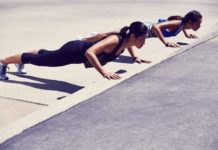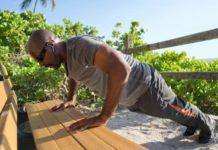
4 Things People Get Wrong About Running
When it comes to running, there are plenty of truths: It improves your health. It can help you lose weight. It can even make you happier. But there’s a lot of misconceptions attached to running floating out there, too.
Here, we bust some of the sport’s major myths — and offer even more reasons to call yourself a runner.
MYTH #1: “RUNNING IS BAD FOR YOUR KNEES”
The Truth: Sure, your entire body — including your knees — takes a pounding with every step you run. But studies show that running actually strengthens your knees and other joints, and improves your bone health. “Running is not bad for you,” insists Ryan Bolton, a running coach with Training Bible in Santa Fe, New Mexico. “We were all physically made to run.”
To prevent damage to your knees or anywhere else on your body, first start with the right pair of shoes. Not sure which sneaks to select? Head to your local running specialty store for a gait analysis, which will reveal the type of shoe that has the right combination of cushion and support for you.
Then, gently ease into running by alternating between walking and jogging, gradually decreasing the time you walk. Bottom line? To avoid completely shocking your system, give your body time to adjust to running before you really start pounding the pavement.
 AllWhites® are lower in fat, calories and cholesterol and higher in protein than shell eggs, providing energy for every day. If you are an egg lover, you can enjoy your favorite food while feeling good about your choice.
AllWhites® are lower in fat, calories and cholesterol and higher in protein than shell eggs, providing energy for every day. If you are an egg lover, you can enjoy your favorite food while feeling good about your choice.
MYTH #2: “I’M GOING TO LOSE A TON OF WEIGHT AS SOON AS I START RUNNING”
The Truth: While running can be one of the most effective ways to lose weight, you’re not necessarily going to see instant results. And there’s a variety of reasons why, ranging from your approach to running (long, slow runs may keep your metabolism static) to the fact that high-intensity exercise can increase appetite — so just be wary that you’re not eating more than you burn when trying to lose weight.
The simplest way to see results from running? Stop looking at the scale.
“Scales don’t differentiate between fat, muscle, water retention or the clothes you’re wearing,” says Shannon Downey, a health and fitness expert in Chicago, Illinois. “If you feel good, have more energy, and notice that your clothes fit better, you’ll know [the running] is working.”
MYTH #3: “I DON’T NEED TO DO ANY OTHER TYPE OF EXERCISE IF I RUN”
The Truth: Wouldn’t life be so simple if all we had to do was lace up our shoes and head out the door? While running provides a total body workout, it’s not the end-all-be-all when it comes to exercise. That’s why we have cross-training — or non-running exercises like cycling, swimming or even a Zumba class.
“For the best results, it’s important to mix three forms of training: higher intensity interval training to help raise your metabolism, strength training to build lean muscle (which burns fat) and steady-state cardio training to burn extra calories at lower intensities,” explains Brett Hoebel, a professional trainer in Los Angeles. “Choosing one different cross-training exercise a day can target all three areas.”
Besides that, a regular cross-training routine can help you prevent injuries and bust boredom — both of which may come along with running only. So supplement your running with some cross-training, and you’ll be a better (and stronger) runner for it.
MYTH #4: “I’M NOT SKINNY OR YOUNG ENOUGH TO START RUNNING”
The Truth: Anybody can be a runner. Just head out to a local road race and you’ll see people of all ages and body sizes streaming by. Or take a look at runners like Fauja Singh, the Indian-born Brit who retired from running at the age of 101 — after taking up marathons at the age of 89. And 39-year-old professional runner Blake Russell, a mom of two, who became the second-oldest woman to snag an American marathon title with her win at the 2015 U.S. marathon championships in Los Angeles. So what’s your excuse again?
While it can be super scary to start up a running routine as an adult, it’s completely doable — even if you don’t consider yourself to have an “ideal” runner’s body.
As writer John “The Penguin” Bingham wrote: “If you run, you are a runner. It doesn’t matter how fast or how far. It doesn’t matter if today is your first day or if you’ve been running for 20 years. There is no test to pass, no license to earn, no membership card to get. You just run.”
So what are you waiting for? Just run already.
Written by Sarah Wassner-Flynn, a longtime runner and triathlete who has been able to blend her passions for endurance sports and writing into a freelance career. When she’s not writing about running, Sarah is usually training or competing. Sarah lives just outside of Washington, D.C. with her husband, Mark, and their three children. Follow her on Instagram and Twitter.
































